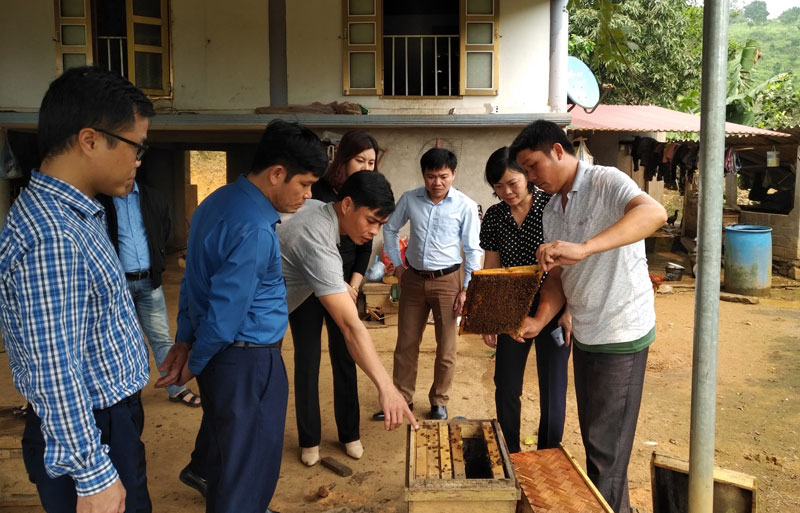
(HBO) – Phase II of the Forest and Farm Facility (FFF) programme has been carried out by Hoa Binh province Farmers’ Association since 2019. It aims to raise capacity of forest growers, families, women, youths and people of ethnic minority groups, facilitating poverty reduction and climate change adaptation.

Officers of the
provincial Farmers’ Association survey, assess a beekeeping model in Phase II of
the FFF programme in Tu Ne commune (Tan Lac district).
The association surveyed and decided to implement the
programme in An Binh commune (Lac Thuy district) and the communes of Dong Lai
and Tu Ne (Tan Lac district). Its project management board joined hands with local
authorities and Farmers’ Associations of districts and communes to set up key
groups at the communal level.
Training courses were arranged for members of the groups to
improve their skills and promote understanding of teamwork’s benefits, in a bid
to develop forests and farms along with keeping with environmental protection.
They were hoped to help women, youths and people of ethnic
minority groups in sustainable production of agro-forestry-fishery goods,
raising values of forests and improving landscapes and income.
The Muong Cu forest growing and beekeeping group in Cu
village of Tu Ne commune is said to be among the most effective models operated
by farmers. At present, 20 farmer households join the group, keeping a total of
600 colonies of honey bee.
Through the FFF programme, members were able to take part in
training courses in beekeeping, business skills and policy dissemination, among
others.
After one year of implementation, Phase II of the FFF programme
has seen initial results, creating a driving force for the community and
farmers to continue activities in the forest-based sector.
Three cooperatives have been set up and run effectively,
generating jobs for local workers.
The programme also facilitated the establishment of two
groups on beekeeping and growing citrus trees in Tu Ne commune, a group on
organic pomelo cultivation in Dong Lai commune (Tan Lac ditrict) and a model of
raising chickens in An Binh commune (Lac Thuy).
Products of the groups and cooperatives are shipped to various
markets with stable prices. Tens of local workhands earn stable jobs with an
average monthly income of 5 million VND (215 USD)./.
Hoa Binh province is undergoing a dynamic transformation amid Vietnam’s national digital transition. Building on Poliburo’s Resolution No. 57-NQ/TW on breakthroughs in science, technology, innovation, and national digital transformation, the province has rolled out a wide range of practical action plans. A standout initiative is the "Digital Literacy for All” movement, an effort to ensure that no one is left behind in the digital era.
Hoa Binh province is undergoing a dynamic transformation in the wake of the national digital transformation movement. Building on Resolution No. 57-NQ/TW of the Politburo on breakthroughs in science, technology, innovation, and national digital transformation, the province has implemented a wide range of practical action plans. A standout initiative is the "Digital Literacy for All” movement ambitious effort to ensure that no one is left behind in the digital age.
With a spirit of unity and proactive problem-solving, the Party Committee, the government and the people of Dong Lai Commune (Tan Lac District) have made great strides in implementing the resolutions of the 24th Party Congress of the commune for the 2020 - 2025 term. Focusing on leadership and practical actions, the commune has brought the Party’s resolutions into daily life, creating strong impacts and pushing the local development forward.
Amid the nationwide push for digital transformation, young people in Hoa Binh Province are stepping up as dynamic pioneers, applying technology to enhance Youth Union operations and expand the reach of youth-led initiatives. Through creativity and adaptability, Youth Union organizations at all levels have introduced a series of practical solutions, contributing to modern governance and community development.
In recent years, An Nghia commune, located in Lac Son district, has stepped up administrative reform, focusing on improving the quality and efficiency of its single-window service unit for receiving and processing administrative procedures. These improvements have helped create favourable conditions for local residents and organisations to handle administrative procedures, contributing to the commune’s broader socio-economic development.
The Prime Minister-approved master plan to develop the multi-use value of forests ecosystems through 2030, with a vision to 2050, aims to improve the management and sustainable use of forest resources, create jobs, increase incomes, and improve the living standards of ethnic minorities, people in mountainous and remote areas, forest workers and those living near forests.



